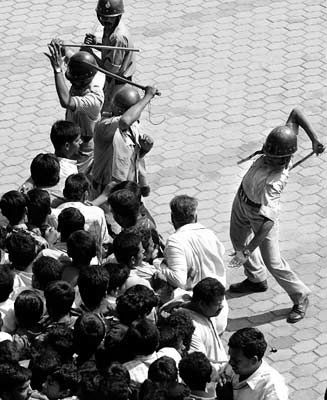Withdrawn Module: Nonviolent Resistance: A Global History 1830-2000 (HI31D)
 Please note that this module was available
Please note that this module was available
from 2007 to 2010, but has since been
withdrawn and is no longer available.
Tutor: Professor David Hardiman
This undergraduate final-year Advanced Option module examines the history of nonviolent resistance in a global perspective during the modern period. It examines the ways in which the method has evolved over time, bringing out how protesters learnt from past struggles, in the process evolving their own strategies and techniques in the context of their own societies. It provides, therefore, a case study of a global dialogue.
The module will bring out the way in which a range of different and evolving issues could be asserted through this means, ranging from working class demands of Britain in the 1830s and 1840s, to nineteenth century nationalist causes, notably that of the Hungarians within the Hapsburg Empire, the Finns within the Russian Empire, the demand for independence by Indian nationalists led by Gandhi (who reframed the concept as satyagraha), nonviolent resistance to the Nazis, the anti-apartheid movement in South Africa, the civil rights movement by African-Americans in the USA, the upsurge in eastern Europe in the 1980s, and the pro-democracy protests in Burma in 1988 and China in 1989 that failed. This list is by no means exhaustive, and students may explore movements other than the ones focussed on in the weekly seminars in their written work, examining the efficacy of the method in a variety of particular historical contexts. There will also be a discussion of the efficacy of the method; when it has worked best and when it has failed; and the relationship between nonviolent and violent resistance, such as terrorism, and warfare.
